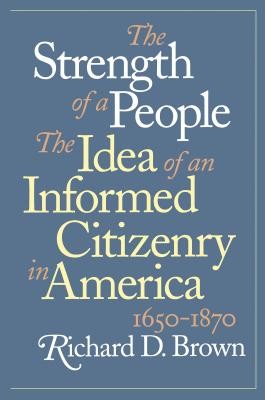
- We will send in 10–14 business days.
- Author: Richard D Brown
- Publisher: University of North Carolina Press
- ISBN-10: 0807846635
- ISBN-13: 9780807846636
- Format: 15.7 x 23.7 x 1.9 cm, softcover
- Language: English
- SAVE -10% with code: EXTRA
Reviews
Description
Thomas Jefferson's conviction that the health of the nation's democracy would depend on the existence of an informed citizenry has been a cornerstone of our political culture since the inception of the American republic. Even today's debates over education reform and the need to be competitive in a technologically advanced, global economy are rooted in the idea that the education of rising generations is crucial to the nation's future. In this book, Richard Brown traces the development of the ideal of an informed citizenry in the seventeenth through nineteenth centuries and assesses its continuing influence and changing meaning. Although the concept had some antecedents in Europe, the full articulation of the ideal relationship between citizenship and knowledge came during the era of the American Revolution. The founding fathers believed that the First Amendment's guarantee of freedom of the press, religion, speech, and assembly would foster an informed citizenry. According to Brown, many of the fundamental institutions of American democracy and society, including political parties, public education, the media, and even the postal system, have enjoyed wide government support precisely because they have been identified as vital for the creation and maintenance of an informed populace.
EXTRA 10 % discount with code: EXTRA
The promotion ends in 20d.11:03:54
The discount code is valid when purchasing from 10 €. Discounts do not stack.
- Author: Richard D Brown
- Publisher: University of North Carolina Press
- ISBN-10: 0807846635
- ISBN-13: 9780807846636
- Format: 15.7 x 23.7 x 1.9 cm, softcover
- Language: English English
Thomas Jefferson's conviction that the health of the nation's democracy would depend on the existence of an informed citizenry has been a cornerstone of our political culture since the inception of the American republic. Even today's debates over education reform and the need to be competitive in a technologically advanced, global economy are rooted in the idea that the education of rising generations is crucial to the nation's future. In this book, Richard Brown traces the development of the ideal of an informed citizenry in the seventeenth through nineteenth centuries and assesses its continuing influence and changing meaning. Although the concept had some antecedents in Europe, the full articulation of the ideal relationship between citizenship and knowledge came during the era of the American Revolution. The founding fathers believed that the First Amendment's guarantee of freedom of the press, religion, speech, and assembly would foster an informed citizenry. According to Brown, many of the fundamental institutions of American democracy and society, including political parties, public education, the media, and even the postal system, have enjoyed wide government support precisely because they have been identified as vital for the creation and maintenance of an informed populace.


Reviews